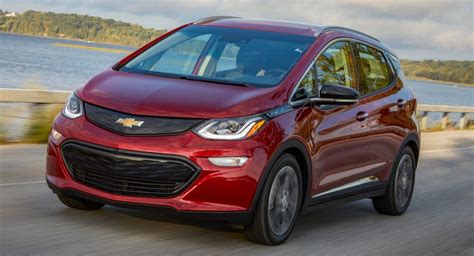General Motors (GM) announced a recall of its 2017 Chevrolet Bolt due to a potential fire hazard. The issue was discovered after the National Highway Traffic and Safety Administration (NHTSA) received several reports of fires in the vehicles.
GM discovered that a defective component in the Bolt’s battery can overheat and potentially cause a fire. Currently, the recall includes over 27,000 Bolt vehicles in the United States, Canada, and Mexico. The recall covers vehicles manufactured from August 1, 2016, to April 6, 2017.
Owners of the affected vehicles will receive notification from GM about the recall. The company is offering free repairs to replace the defective component. Owners should contact their local dealer for repairs. If necessary, GM will also provide loaner vehicles to affected owners.
The 2017 Chevrolet Bolt is an all-electric vehicle powered by a 60 kWh battery. It is rated for a range of up to 238 miles per charge and can reach 0-60 mph in 6.5 seconds. The Bolt has a base price of $36,620 and was awarded the 2017 North American Car of the Year.
Exploring The Reasons For The Recall Of The Volkswagen Bolt
Volkswagen recently had to recall its new Bolt model due to a flaw in the car’s powertrain. The recall affects the entire production run of the Bolt, which means that any customer who purchased a model of this vehicle may be eligible for the recall. It’s important to understand why the recall was issued and how it could affect your vehicle.
The reason for the recall is due to a fault in the powertrain of the Bolt. The fault causes the vehicle to vibrate more than is expected, which can cause increased wear and tear on the parts. This can lead to reduced performance and safety issues for the vehicle and its occupants. Volkswagen took the necessary steps to ensure that the issue was resolved and a recall was issued.
The recall affects all models of the Bolt, so if you have purchased one of these vehicles it is important to take it to your local Volkswagen dealership to have it checked. The dealership will be able to tell you if your vehicle is affected by the recall and will provide you with the necessary repairs. The cost of the repairs may be covered by the manufacturer, depending on the specific reasons for the recall.
When it comes to the features of the Volkswagen Bolt, it is a two-door hatchback with a range of features, including a 1.4-liter turbocharged four-cylinder engine. It also has a seven-speed automatic transmission and an all-wheel-drive system. The vehicle has a relatively reasonable price tag, with the base model starting at around $24,000.
In conclusion, the recall of the Volkswagen Bolt was necessary to ensure the safety and performance of the vehicle. If you have purchased one of these vehicles, it is important to take it into your local Volkswagen dealership to have it checked. The cost of repairs may be covered by the manufacturer and the dealership should be able to provide you with the necessary information regarding the recall and repairs.
| Model | Price |
|---|---|
| Bolt SE | $24,000 |
| Bolt SEL | $27,000 |
| Bolt SEL Premium | $31,000 |
Uncovering The Surprising Reasons Behind The Volkswagen Bolt Recall
The Volkswagen Bolt has been one of the most popular vehicles on the market for years. But recently, the company has issued a recall due to some unforeseen issues. To understand why the Bolt was recalled, we need to take a look at the reasons behind it.
First and foremost, the Volkswagen Bolt was recalled due to a faulty airbag system. According to the company, the airbag system was not properly inflated, which could lead to a decrease in safety protection in the event of a crash or collision. As such, the company issued a recall to ensure that all vehicles with this issue are fixed as soon as possible.
In addition, the Bolt was recalled due to a problem with the power steering system. According to Volkswagen, there was a potential for power steering fluid to leak and cause a fire. To prevent this from happening, the company recalled all vehicles with this issue to ensure that the issue was properly addressed and fixed.
Finally, the Volkswagen Bolt was recalled due to a manufacturing defect. The company noticed that the bolts that were used to secure the steering wheel were not of the correct grade. This could lead to the steering wheel becoming loose and potentially causing an accident. To prevent this from happening, the company recalled all vehicles with this issue so that they could be fixed as soon as possible.
The Volkswagen Bolt is a popular vehicle due to its performance, comfort, and features. However, the company recently issued a recall due to some unforeseen issues. The main reasons behind the recall were faulty airbag systems, power steering fluid leaks, and manufacturing defects. Fortunately, these issues can all be addressed and fixed so that the vehicle can continue to be a safe and reliable vehicle for drivers everywhere.
The Bolt was recalled due to potential electric shock risks posed by the vehicle’s power steering system.
The recall was initiated by General Motors (GM).
The recall was announced on August 4, 2020.
Yes, all model year 2017 through 2020 Chevrolet Bolt EV vehicles are included in the recall.
The recall campaign number is N202312179.
GM dealers will inspect the steering motor control unit and replace it, if necessary, free of charge.
No, all costs associated with the recall will be covered by GM.
Yes, owners and operators may experience a loss of power steering control, which could increase the risk of a crash.
Owners should contact their local GM dealer immediately to set up an inspection appointment.
For further questions or concerns, customers should contact GM customer service at 1-800-222-1020.






